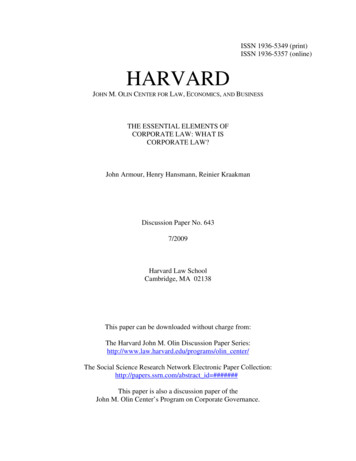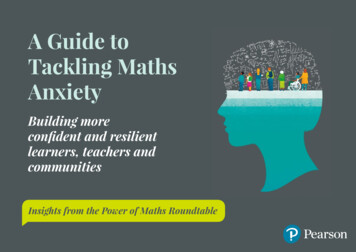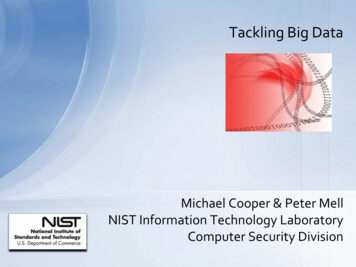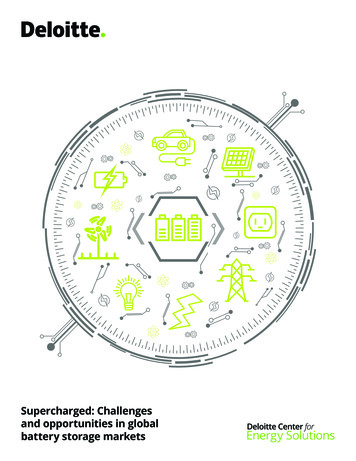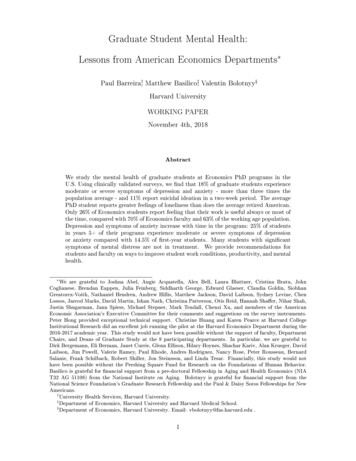
Transcription
TACKLING GLOBAL CHALLENGES:Lessons in System Leadership from the World Economic Forum’sNew Vision for Agriculture InitiativeJane Nelson and Beth Jenkins
Tackling Global Challenges:Lessons in System Leadership from the World EconomicForum’s New Vision for Agriculture InitiativeWritten by Jane Nelson and Beth JenkinsDesigned by Alison BeanlandCover photographs: African farmer insights from King DavidAmoah, President, Farmers Organization Network in Ghana,participating in a meeting of the NVA Transformation LeadersNetwork World Economic Forum publications.Farmer, Mynmar szefel/Shutterstock.Food vendor, India trait2lumiere/iStock.Participants in a multi-stakeholder NVA working Group at theWorld Economic Forum Annual Meeting in Davos, including(from left sitting): Jackie Mkindi, Executive Director, TanzaniaHorticulture Association; Berry Marttin, Member of the ExecutiveBoard, Rabobank Group; Agnes Kalibata, President, Alliancefor a Green Revolution in Africa (AGRA); and Shenggen Fan,Director-General, International Food Policy Research Institute(IFPRI); and (from left standing): Ajay Vir Jakhar, Chairman,Bharat Krishak Samaj (Farmers' Forum India); and Thomas Nagy,Executive Vice-President, Supply Operations, Novozymes A/S World Economic Forum publications. 2016 by the CSR Initiative at theHarvard Kennedy School
TACKLING GLOBAL CHALLENGES:Lessons in System Leadership from the World Economic Forum’sNew Vision for Agriculture InitiativeExecutive summary51. The need for system leadership72. The New Vision for Agriculture story103. Lessons in system leadership from the New Vision for Agriculture16Cultivating a shared vision for change19Empowering widespread innovation and action22Enabling mutual accountability for progress254. Mainstreaming system leadership28Acknowledgements30Research background and methodology31Endnotes32
“Ultimately, we need system change—the very nature of capitalism: whatit means to be a consumer—to be a citizen. And to achieve this change, wemust work in coalition. After all, business cannot stay on the sidelines of asystem that gives them life in the first place.”Paul PolmanCEO, Unilever and member, World Economic Forum Global Agenda Trustees onFood Security and AgricultureRemarks at UN Global Compact Summit, UN General Assembly, New York,25 June 2015“The innovative approach of the World Economic Forum’s New Visionfor Agriculture initiative has generated extraordinary momentum todate, putting a transformational vision into action around the world.This approach can serve as a model for leaders seeking to addresscomplex global challenges in many other sectors and regions.”Prof. Klaus SchwabFounder and Executive Chairman, World Economic Forum“To enable environmentally sustainable and inclusive agriculture growth weneed partnership among stakeholders across the agricultural value chain,including government, domestic, regional and multinational companies,multilateral and civil society organizations, farmers, consumers andentrepreneurs. Farmers should be recognized as not only beneficiariesand producers but also as equal partners, at the center of the partnership,with significant involvement in the decision-making processes.”Estrella PenuniaSecretary-General, Asian Farmers Association for Sustainable Rural Developmentand Member, Grow Asia Steering Committee“Only by rapidly transforming the agriculture sector can Africa meet thegrowing food needs of its urban population, while boosting incomes formillions of its farmers—the majority of whom are women—and creatingmuch needed jobs. We must think differently: grow agriculture as a business,to become a wealth-creating sector, not one for managing poverty.”Dr. Akinwumi AdesinaPresident, African Development Bank GroupInaugural speech, Abidjan, September 1, 20154 TACKLING GLOBAL CHALLENGES: LESSONS IN SYSTEM LEADERSHIP FROM THE WORLD ECONOMIC FORUM’S NEW VISION FOR AGRICULTURE INITIATIVE
Executive SummaryA special form of leadership, system leadership, is needed to tackle globalchallenges like food security, climate change, job creation, and gender parity.These challenges are complex and systemic, rooted in theactions and interactions of diverse yet interconnected,interdependent stakeholders. Leaders in business,government, and civil society increasingly recognize thatthey cannot be addressed in a top-down, pre-planned,linear fashion and that point solutions don’t work. Instead,the solutions require stakeholders to change the way theyoperate at the global, national, and local levels. Over time,they must develop new technologies, products, services,business models, public service delivery models, policy andregulatory innovations, voluntary standards, and culturalnorms and behaviors that together deliver new results.System leadership can help align the efforts of diversestakeholders in order to accelerate this process, and ensurethat it delivers more sustainable, inclusive business growthand human development.Individuals, institutions, and interactive structures allhave system leadership roles to play.Individual leaders and institutions across business,government, and civil society must pursue their interests inways that benefit the broader systems in which they operate,recognizing that in the long term, the two are inextricablylinked. And innovative interactive structures—calledbackbone organizations, multi-stakeholder initiatives, crosssector coalitions, or partnership platforms—must mobilize,support, align, and coordinate the efforts of individuals andinstitutions system-wide.System leadership works by cultivating a shared visionfor change, empowering widespread innovation andaction, and enabling mutual accountability.A shared vision galvanizes diverse stakeholders and helpsto ensure that their efforts align, complement, and buildon one another, producing better results faster than theycould otherwise have done. While not all stakeholders willbe early movers, a critical mass of individual, institutional,and interactive system leaders must innovate and act inorder to “tip” the system and influence the rest. And mutualaccountability is both a powerful incentive and a criticalenabler. In a system, where stakeholders are interdependent,they will only sustain the investment of time, effort, andresources needed to play their parts if the others do, too.Country ownership and action are essential for on theground impact and change.There is growing recognition that strong individual andinstitutional system leadership, supported by stronginteractive structures, are especially important at thecountry level. The need spans business, government, andcivil society—but efforts to drive systemic change cannotbe sustained or scaled without proactive leadership fromgovernment leaders and relevant ministries, or withoutclear alignment between national development priorities,public policies and market-based approaches. Country-led,country-based interactive structures that bring stakeholderstogether across sectors with the explicit purpose of fosteringcommunication and collaboration and coordinating theiractivities can help to achieve the necessary alignment.The World Economic Forum’s New Vision for Agriculture(NVA) initiative is one example of system leadership inpractice, and a rich source of insight for those seeking toexercise it.The NVA aims to transform agricultural systems to improvefood security, environmental sustainability, and economicopportunity. It is at a relatively early stage in what willbe a long-term process of mobilizing the wide range ofactors needed to drive systemic change. Nevertheless, itdemonstrates how individual, institutional, and interactivesystem leadership can come together to create momentumfor such change. In particular, the NVA demonstrates thepotential of establishing interactive structures at the countrylevel to coordinate the efforts of diverse stakeholders acrosssectors and value chains. This report seeks to distill thelessons—and strategic questions—for system leaders inagriculture, food security, and beyond. These are summarizedin the diagram on page 6.TACKLING GLOBAL CHALLENGES: LESSONS IN SYSTEM LEADERSHIP FROM THE WORLD ECONOMIC FORUM’S NEW VISION FOR AGRICULTURE INITIATIVE 5
To tackle global challenges, we will need to develop,implement, and scale up diverse, interlocking solutionsthat together transform entire systems—and we willneed to mainstream system leadership to achieve it.In 2015, the member states of the United Nations adoptedthe Sustainable Development Goals, focused on 17 globalchallenges, and endorsed historic agreements to tackleclimate change and mobilize financing for development.To realize these ambitious commitments, we will need morethan ever before to combine domain expertise and technicalskills with the ability to think and act systemically. Companies,governments and civil society organizations need to developand reward many more individuals with this still relativelyrare combination of mindsets and skill sets. These institutionsmust adapt their internal organizational structures, processesand delivery models to be more effective at working inpartnership and through broader networks. And they mustmake long-term investments in the interactive structuresthat serve to strengthen communication, coordination andcollaboration among them.None of this is easy. It requires a deliberate commitment oftime, talent and financial resources. Yet it creates enormousopportunity for impact, developing individual leaders,organizations, and systems that are fit-for-purpose in anincreasingly complex and uncertain future.Three Key Roles of System Leadershat mobilize, supctures tpROLE1Cultivate a sharedvision for change1. Understand the system2. Identify and engagekey stakeholdersEnable mutualROLE accountabilityfor progress2. Measure and reporton mutually agreedindicatorsMoundal bio n21. Align incentives withinand across organizations2. Strengthen individualand institutional capacities3. Mobilize financialresourcesAacLERSROLEdi tTEDEEmpower widespreadinnovation and actiont raS YS3. Establish crediblegovernancestructuresaries1. Develop clearconsultation andfeedback mechanismsss33. Facilitate co-creationroINTERACINSTITUTIO TIVESNAL S YSTYS ETINDIVIDUALeaders to acceleratestem lprogal syressionitutroader systems in whichnstthethe bdiyanandopevesratseleemthfitluavidruort,andIP StHcooSations that opezinaRgrrdiOEraPtIeDnain wHSAteRaEysEinLDthadiAM LEtbeneEMH IPIndivid ua ls w h o c a n t hi n k s yste micalnly adact6 TACKLING GLOBAL CHALLENGES: LESSONS IN SYSTEM LEADERSHIP FROM THE WORLD ECONOMIC FORUM’S NEW VISION FOR AGRICULTURE INITIATIVE
1 The need for system leadershipSustainable, inclusive business growth and human development depend on ourability to tackle complex global challenges and drive long-term change.Business, government, and civil society share an interestin tackling these challenges. Companies that do so canstay ahead of evolving trends, improve their operatingenvironments, manage risk, reduce costs, strengthencompetitive positioning, and create or capture new markets.1Governments and civil society organizations must do so tofulfill their mandates and missions. In September, 2015, the193 member states of the UN General Assembly committedto partner across national and sector boundaries to address17 such challenges, formally adopting the 2030 Agendafor Sustainable Development, followed by adoption of theParis Agreement within the UN Framework Convention onClimate Change in December, 2015. Both of these historicglobal agreements are testament not only to internationaldiplomacy and cooperation, but also to unprecedenteddialogue and consultation between political, business andcivil society leaders.2 Attention most now turn to delivery.These challenges are complex and systemic. They havearisen over periods of years, even decades, from the actionsand interactions of many diverse yet interconnected,interdependent stakeholders. And these stakeholders mustchange the way they operate at the global, national, and locallevels in order to resolve them.3A broad academic and practitioner literature makes itclear that tackling complex, systemic challenges is adistributed, adaptive process.4 Top-down, controlled, linearapproaches do not work, because no single individual ororganization has sufficient knowledge, resources, or authorityover others in the system. Instead, the answers emerge asmany different individuals and organizations experiment,learn, and adapt within parameters that are always changingas a result of one another’s efforts. Over time, they developnew technologies, products, services, business models, publicservice delivery models, policy and regulatory innovations,voluntary standards, and cultural norms and behaviors thattogether deliver new results. This process is constant, selforganizing, organic, and therefore unpredictable.A special form of leadership, system leadership, is neededto accelerate this process and ensure that it deliversmore sustainable, inclusive business growth and humandevelopment at scale. As outlined in a recent paper byPeter Senge at the Massachussetts Institute for Technology,Hal Hamilton at the Sustainable Food Lab, and John Kania atFSG, the fundamental role of system leadership is to “fostercollective leadership.” It is to “shift the conditions throughwhich [ ] those who have a problem can learn collectivelyto make progress against it.”5 This must happen at severallevels—individual, institutional and interactive—as outlinedin Box 1.To tackle the many complex, systemic challenges we face,system leadership must emerge into the mainstream.This makes it critical to identify and learn from examples ofsystem leadership in practice. There is a growing number,ranging from city-level alliances to global, issue-focusedinitiatives to improve access to healthcare, nutrition,education, energy, and more. There is also an emerging focuson the concepts of ‘country ownership’ for implementingglobal develop
Box 1 Three dimensions of system leadership. System leadership starts with the individual leader, but has individual, institutional, and interactive dimensions.6These three dimensions are interdependent and equally important in tackling complex, systemic challenges and achieving the outcomes we seek.
